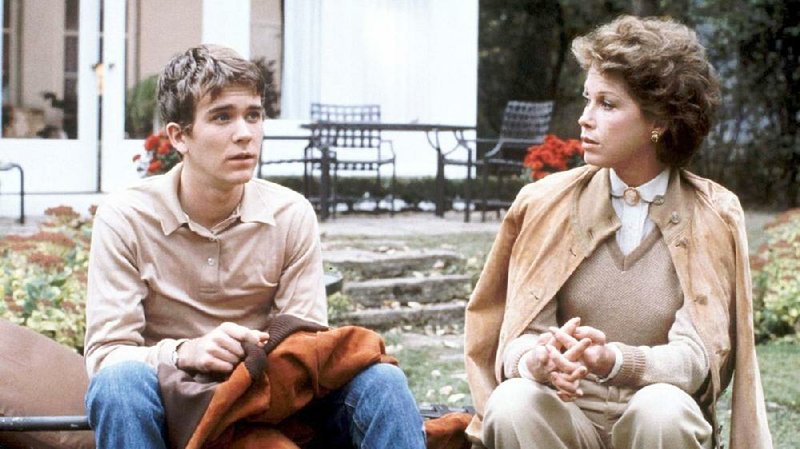My father died in a gun accident when I was 7 and shortly thereafter my mother set me and my older brother loose upon the wilds of Pine Bluff. In the late ’60s a short bike ride would get you most anywhere; tennis courts, baseball fields, bowling alleys, boys clubs and the mysteries of The Hut Head Shop with its incense and black light posters and God knows what else.
And always the woods, full of trails, where anything could happen; you could wind up anywhere. Home away from home was the Saenger Theater, a cavernous movie palace built in the ’20s. It was old when I was young and it still stands today, just barely. My love of movies began there, framing and filtering the wider world; throwing a lasso around its neck, bringing it in for a close-up.
Ordinary People (1980)
Cast: Donald Sutherland, Mary Tyler Moore, Timothy Hutton, Judd Hirsch, M. Emmet Walsh, Elizabeth McGovern, Dinah Manoff, James B. Sikking
Director: Robert Redford
Rating: R
Running time: 2 hours, 4 minutes
Remembered by: Douglas Hagood, Little Rock.
I moved to North Little Rock in 1977. In the fall of 1980, I was about to turn 18 when Ordinary People came along and blew a ragged hole through me.
It played at the UA Cinema 150, the best place in town. Kind of like watching a movie inside the giant golf ball at the Arnold Palmer shooting range down the street. The screen was enormous and curved, wrapping itself around you. It was also the last theater in town to have curtains; the main one was red velvet and another curtain, a translucent scrim, hid behind it.
When the feature began, the velvet curtain drew back. The first images were projected like fog through the scrim, a dream-like effect, drawing you in, like a dimly lit tunnel that took you from one world to another. After a few moments the scrim slowly withdrew, pulling me in, immersed.
The movie begins with a black screen, slowly merges with faint blue light and then into dawn.
A family is in turmoil after the death of the eldest son, in a boating accident. Conrad, the youngest son (Timothy Hutton) survived but wishes he hadn’t. He attempts suicide and is hospitalized for a time and released. We drop in here, and follow Conrad as he attempts and fails to find himself in his old life. He quits the swim team, distances himself from those he loves and who love him. His parents are quietly failing to cope, just like anyone would, drowning in quiet slow motion, all their kicking and screaming trapped, internalized.
Their shared misery pushes them farther and farther apart. Conrad only feels at home with Karen (Dinah Manoff), a suicide survivor he befriended at the hospital, who seems to be thriving. He confesses to Karen it was the hospital time he liked the best. Hutton was about my age and his father, Jim, had recently died young at 45. Jim Hutton was an actor I’d loved on the Ellery Queen TV show.
Ellery was a lovable, absent-minded professor type of brilliant detective who had miniature trains running throughout his house, tunneling from room to room. My grandfather had been a brakeman on the Cotton Belt line and trains were pure magic for me. Now Tim’s father was dead, my father was dead, Conrad’s brother was dead and the Cotton Belt was dead. There was no one to show the way through the haunted past. Up on the screen, it felt like Timothy Hutton was playing for keeps.
Conrad reluctantly visits a therapist, Dr. Berger (Judd Hirsch) who slowly earns his trust.
School friend Jeannine (Elizabeth McGovern) shines the warmest light but Conrad can’t feel it.
Then, the tipping point:
Karen’s father to Conrad: “Karen … Karen’s dead. She killed herself.”
Karen, who seemed to be doing so well. It tips him upside down and he finds himself back where the movie started, back in the lake he has never really left, fighting to keep from going under. In a red panic, he turns on the sink and runs water over his wrists and we watch his suicide scars together for what seems like forever. Will he open the medicine cabinet and pick up a razor blade?
Finally, he turns off the water, picks up the phone, calls for help and help he gets.
Dr. Berger takes Conrad’s hand and walks him back through the accident, shown in flashback. He looks it in the eyes, faces it down. That day at the lake, he was the strongest swimmer.
Conrad reconnects with Jeannine. Her safe, bright-blue eyes open a door in his heart.
I walked out of the theater with my best friends and we were quiet for a while, percolating. I felt blown wide open, exposed, burned down to the bones.
When movies work like this they trick you like subtitles trick you into fluency.
We sat in silence for a while, then we all started talking and the conversation transformed into a kind of exorcism. Secrets, dreadful and dear, poured out like flies.
Later, our words ricocheted in unexpected ways like magic bullets. Later still I read the right words: “For here is no place that does not see you, you must change your life.”
And it did that for me, at least in one way. For a time I became a kind of catharsis junkie, tapping into that vein whenever I could.
These days I don’t expect so much from movies. I don’t need as much from movies as I once did. They’ve given me plenty.
